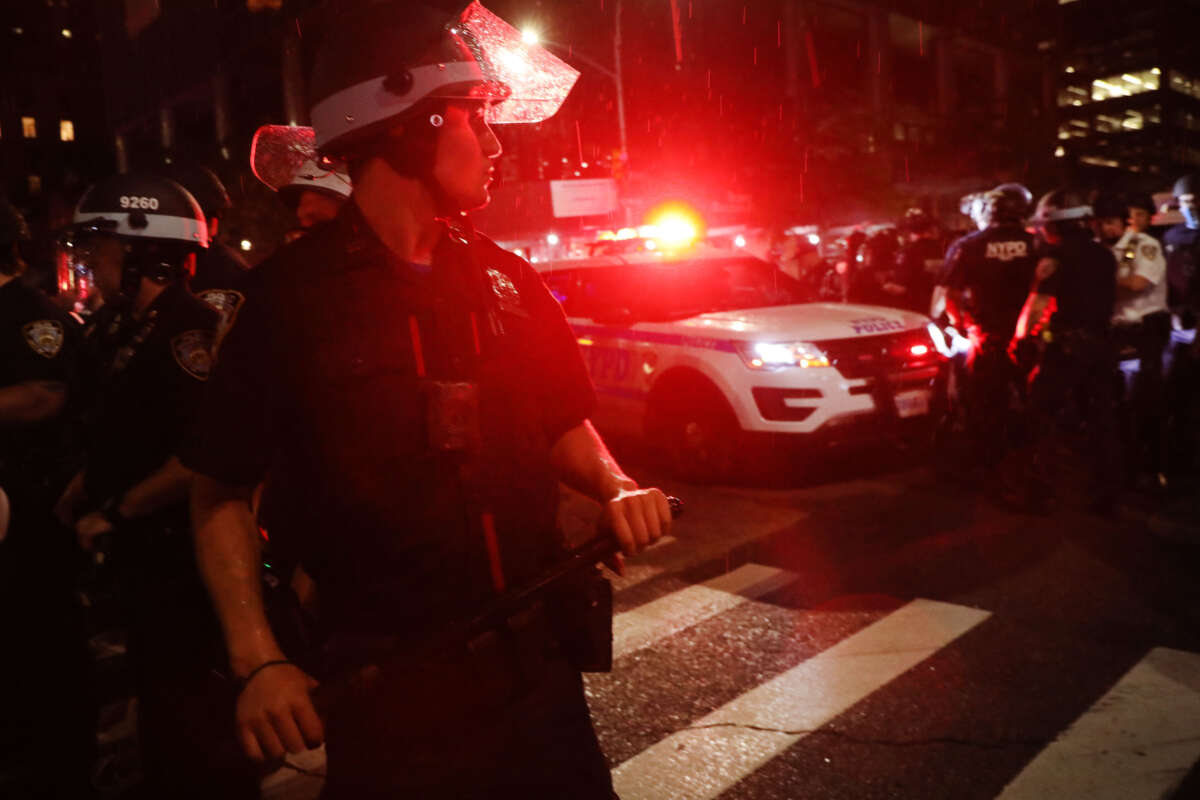Honest, paywall-free news is rare. Please support our boldly independent journalism with a donation of any size.
New York City has agreed to a record-breaking settlement of more than $13 million in the civil rights lawsuit brought on behalf of nearly 1,300 people who were abused and arrested by police during the George Floyd uprisings of 2020 — one of the most expensive payouts ever awarded in a lawsuit over mass arrests.
The lawsuit, brought by lawyers associated with the National Lawyers Guild (NLG) – New York City, focused on 18 of the many protests that erupted in the city after the police murder of George Floyd in Minneapolis. The lawsuit alleged that the New York City Police Department (NYPD) deprived protesters of their First Amendment rights through a coordinated campaign of unlawful arrests.
“The legal team tracked and studied scores of locations as part of litigation,” a statement on the settlement details. “The analysis revealed clear patterns of systemic police misconduct. Far from being a case of a few bad apples, the widespread nature of the misconduct, coupled with the lack of meaningful investigation or discipline, paints the picture of a police department in need of deep operational and cultural reform.”
According to a 2020 report by the New York state Office of the Attorney General regarding the NYPD’s response to the May and June protests, demonstrators were met with “excessive force, kettling [and] false arrests” by the police. The NYPD also targeted the press, NLG legal observers and elected officials who were present at the uprisings.
An NYC Department of Investigation (DOI) report that examined the NYPD’s conduct during the protests found that “the NYPD lacked a sufficiently tailored strategy to respond to protests, used force and tactics of crowd control that led to excessive force and ‘heightened tensions,’ made decisions based on intelligence that lacked ‘context or proportionality,’ and deployed officers who lacked sufficient training in responding to protests.”
The $13 million settlement will ensure that protesters for racial justice who were subjected to force by the NYPD will each be eligible for $9,950 in compensation. “Like the protests themselves, the resulting litigation, and this settlement and others like it, all send a clear message that police abuse of power and suppression of dissent will not be tolerated, and that fundamental changes to policing altogether are essential,” the statement explained.
In another class action settlement announced earlier this year, New York City agreed to pay several million dollars — or $21,500 to each of at least 200 protesters — in a lawsuit brought by demonstrators from Bronx’s Mott Haven neighborhood who allege that they were assaulted during violent “kettling” by police in the 2020 protests. (Kettling is a law enforcement tactic in which police force crowds of demonstrators into a confined area.) In 2020, the civil rights organization Human Rights Watch released a report citing evidence that police had planned an aggressive crackdown on Mott Haven protesters.
Wylie Stecklow, an attorney for the protesters in the $13 million settlement civil rights case, said that the growing cost to taxpayers should be a red flag that shows there is a “need to correct NYPD’s decades old problem with constitutional compliant protest policing.”
During the 2020 protests, activists demanded that police departments be defunded and dismantled. In New York City, hundreds of thousands of people took to the streets to protest the police killings of George Floyd, Breonna Taylor, and others. Between May 28 and June 5, 2020, approximately 2,047 protesters were arrested during the uprisings; Black arrestees were disproportionately charged with felonies, according to the DOI.
“The harmful realities we were protesting in 2020 persist,” said Savitri Durkee, a plaintiff in the settled civil rights lawsuit. “Black and brown people are disproportionately harassed, prosecuted, jailed and killed by police. This settlement doesn’t address that injustice, what it does do is affirm our constitutional right to protest that injustice, and protest we must.”
The 2020 uprisings were waged by between 15 and 26 million people, making the Black Lives Matter movement the largest social justice movement in U.S. history. But since then, many police department budgets have increased and police killings have continued.
“People in New York City protesting police brutality were met with police brutality. This is how the police function and how the system was designed to work,” Elena Cohen, one of the attorneys who achieved the record-breaking settlement, told Truthout. “We don’t want more historic settlements — we want police out of protests.”
A terrifying moment. We appeal for your support.
In the last weeks, we have witnessed an authoritarian assault on communities in Minnesota and across the nation.
The need for truthful, grassroots reporting is urgent at this cataclysmic historical moment. Yet, Trump-aligned billionaires and other allies have taken over many legacy media outlets — the culmination of a decades-long campaign to place control of the narrative into the hands of the political right.
We refuse to let Trump’s blatant propaganda machine go unchecked. Untethered to corporate ownership or advertisers, Truthout remains fearless in our reporting and our determination to use journalism as a tool for justice.
But we need your help just to fund our basic expenses. Over 80 percent of Truthout’s funding comes from small individual donations from our community of readers, and over a third of our total budget is supported by recurring monthly donors.
Truthout has launched a fundraiser to add 379 new monthly donors in the next 6 days. Whether you can make a small monthly donation or a larger one-time gift, Truthout only works with your support.
